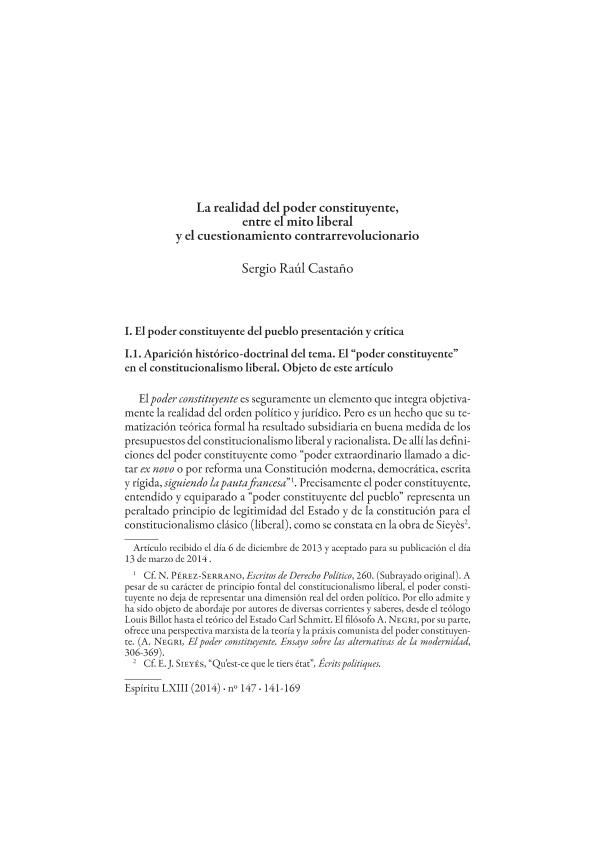Mostrar el registro sencillo del ítem
dc.contributor.author
Castaño, Sergio Raul

dc.date.available
2017-06-12T17:04:23Z
dc.date.issued
2013-12
dc.identifier.citation
Castaño, Sergio Raul; El poder constituyente, entre el mito liberal y el cuestionamiento contrarrevolucionario; Balmesiana; Espíritu; 63; 147; 12-2013; 141-165
dc.identifier.issn
0014-0716
dc.identifier.uri
http://hdl.handle.net/11336/17994
dc.description.abstract
Part I of this article starts by approaching the idea of the constituent power of the people, typical of liberal constitutionalism, as posited by Sieyès and received by the political and legal system currently in force in the West. Then comes a demonstration of the unviability of the concept that proposes that someone could be entitled to social or political command without exercising it (as postulated by the so-called ?sovereignty of the people?): as a matter of fact, social and political command is a form of legal power essentially linked to the performance of a duty, and therefore the holder of that power will be the person who (legitimately) exercises command; some remarks on the so called sovereignty ?in the State? and on the real sovereignty of the State; and finally a suggestion in favor of a realistic view of the causal role of consensus at the constitutional level. Part II aims to give a systematic answer to the question of the constituent power. Firstly, the two terms that make up the locution are analyzed (i. e., ?political power? and ?constitution?). Then it is made clear that the constituent power is one of the functions of political power. Consequently, it is concluded that the principle of the constituent power of the people (or the nation) has no foundations in objective reality. Part III focuses on the modern counterrevolutionary assumptions concerning the constitution (as posited by Joseph de Maistre) and demonstrates how questionable are the grounds ?particularly for a thomist philosophy- from which a critical thesis against the reality and legitimacy of constituent power can be made by such position.
dc.format
application/pdf
dc.language.iso
spa
dc.publisher
Balmesiana
dc.rights
info:eu-repo/semantics/openAccess
dc.rights.uri
https://creativecommons.org/licenses/by-nc-sa/2.5/ar/
dc.subject
Poder Constituyente
dc.subject
Soberanía
dc.subject
Liberalismo
dc.subject
Contrarrevolución
dc.subject.classification
Filosofía, Historia y Filosofía de la Ciencia y la Tecnología

dc.subject.classification
Filosofía, Ética y Religión

dc.subject.classification
HUMANIDADES

dc.title
El poder constituyente, entre el mito liberal y el cuestionamiento contrarrevolucionario
dc.type
info:eu-repo/semantics/article
dc.type
info:ar-repo/semantics/artículo
dc.type
info:eu-repo/semantics/publishedVersion
dc.date.updated
2015-10-15T19:59:41Z
dc.journal.volume
63
dc.journal.number
147
dc.journal.pagination
141-165
dc.journal.pais
España

dc.journal.ciudad
Barcelona
dc.description.fil
Fil: Castaño, Sergio Raul.
dc.journal.title
Espíritu
dc.relation.alternativeid
info:eu-repo/semantics/altIdentifier/url/https://dialnet.unirioja.es/servlet/articulo?codigo=4727428
dc.relation.alternativeid
info:eu-repo/semantics/altIdentifier/url/http://istomas.org/espiritu/
Archivos asociados
